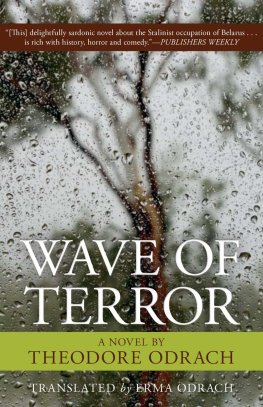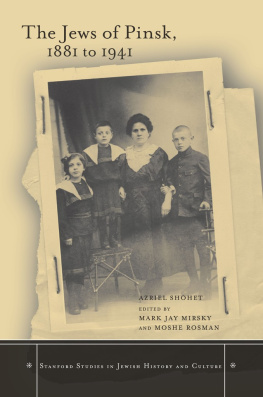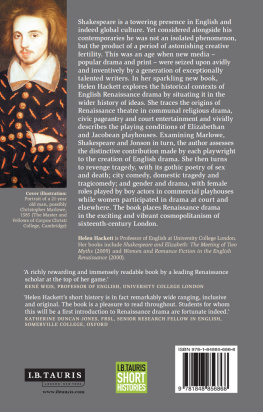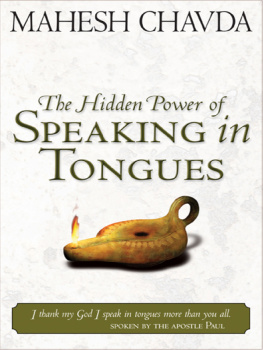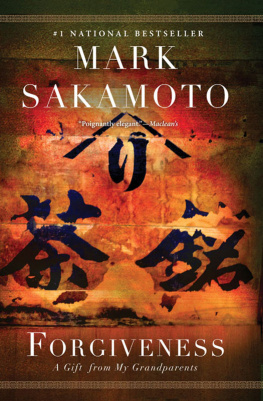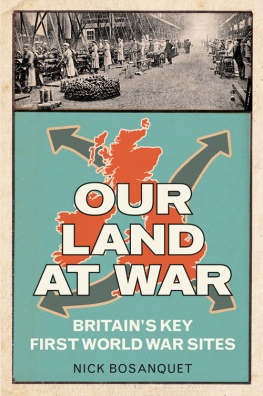Theodore Odrach
Wave of Terror
To Klara, the authors wife,
and his granddaughters
Tania, Claire and Christina.
THEODORE ODRACH: AN INTRODUCTION
Theodore Odrachs life as a writer was brief, prolific, and extraordinary. In the span of eleven years between 1953 and his death in 1964, he wrote four novels, two collections of short stories, a memoir, an historical account of the land from which he sprang, and numerous essays. He wrote during whatever hours he could spend away from his wife and young family at the end of his working day in a Toronto printing shop. To Erma, the daughter who has become his translator, he was doting, loving, and involved, but also unlike the fathers of her friends. He was not only more domestic he did the dishes and regular housework but he was also strange and shadowy. The sound of his typewriter filled the evenings of her childhood and posed a mystery she only began to untangle through the close reading of his writings that transport readers into a complex and difficult world, but one thats observed with gentle humor and genuine humanity.
Open the pages of Wave of Terror and youre immediately an eyewitness to some of the more casual brutalities of the twentieth century the topsy-turvy world of the Ukrainian-Belorussian borderlands as farms, villages, towns, cities, and their peoples pass from Polish to Soviet rule. Odrachs fictional rendering of the ancient town of Pinsk, the village of Hlaby, and the rustic inhabitants of the Pinsk Marshes feels as the everyday world must have felt for ordinary people living through those bizarre times of fraudulent faiths and false hopes. As Headmaster Kulik, who is the eyes, ears, and heart of much of the novel, gazes out the classroom window in the opening paragraphs, the thoughts that weave through his mind raise a question that many ponder but few risk asking: A person rises, then falls; the earth swallows up his flesh and within time he is forgotten. For example just yesterday there was a regime, and today there is another. Yesterdays was swept away, just like that.
Kulik isnt Odrach, but their lives are parallel in an important way: both went to university, studied the past attentively and learned from historical precedent that when the world is in the grip of ideological hysteria, it is the diffident man, the civil although uncertain man, who is far happier than any other. And that makes them masters of their own lives despite all that befall them.
Like his protagonist, Theodore Odrach lived an eventful life. A child of the marshlands, Odrach was born Theodore Sholomitsky in Misiatichy on the outskirts of Pinsk, Belarus on February 13, 1912. At the age of nine, he was taken from his family and sent to reform school in Vilno for minor acts of delinquency. After his release as a teenager, he worked at odd handyman jobs while he put himself through school, graduating with a degree in ancient history and philosophy from the Stefan Batory University (now the University of Vilno). Following the Soviet invasion of 1939, he fled Vilno and returned to the Pinsk Marshes where he taught school in an unusually remote village.
Actively pursued by the Bolsheviks, he moved to Ukraine where he edited and circulated underground newspapers in collaboration with the Ukrainian Insurgent Army as it resisted the Soviets on one front and the Germans on the other. Forced to flee from house to house at the fringes of the forest, setting up and dismantling his presses on the run (a part of his life briefly but memorably sketched in the poignant short story The Night Before Christmas included in The Penguin Book of Christmas Stories, 2005, edited by Alberto Manguel), Odrach ultimately managed to escape across the Carpathian Mountains into Czechoslovakia. At wars end, he made his way first to Germany and then to England where he lived for five years before emigrating to Canada in 1953. Settling in Toronto, he dedicated himself to putting on paper a record of the everyday lives he had witnessed, shaken by fear, betrayed by cowardice, humiliated, persecuted, imprisoned, tortured, slain or permanently displaced as the larger world they inhabited was turned upside down thrice over.
Wave of Terror (originally published in Ukrainian as Voshchad in 1972) was a work-in-progress when Theodore Odrachs writing life ended. It forms the first volume of a projected trilogy that would have dealt with the situation in the borderlands during the Soviet takeover, the German occupation, and the aftermath of World War II. Like Alexander Solzhenitsyn, Odrach learned to survive the horrors he witnessed by remembering precisely what happened to those around him and turning their lives into stories and himself into a writer who is a rigorous investigative reporter as well as a consummate storyteller. Keeping these tales to himself and hidden from the world as he moved from refugee group to refugee group until he found a refuge of his own in Canada, they emerged from his typewriter as short stories and novels in intense bursts of creativity. Long gestation and quick composition give his work unforced urgency. Odrachs individual gift as a recorder of a lost world the thing that sets him apart from his Cold War contemporaries and draws him closer to George Orwell and D.H. Lawrence is the range of his emotional sympathies and, specifically, his unromantic, anti-sentimental, matter-of-fact approach to the sensual lives of girls and women. Odrach has much to tell us that hasnt been reported in this way by anyone else about how the coming of the Soviets affected the sexual identities of women along the outer edges of the USSR as the Kremlin, through the agency of the NKVD (Peoples Commisariat of Internal Affairs), elevated psychopaths and sociopaths to positions of petty tyranny and abusive power, including their domination of women:
Marusia, looking through the open window of her living room, was happy to feel the warmth of spring upon her face. Watching flocks of geese soaring high above the treetops and small red squirrels scrambling from tree limb to tree limb, she thought suddenly of Sobakin. His heavy face, with dark puches under his eyes, haunted her night and day. Marusia felt as if his eyes were always on her. Her only consolation was in knowing that almost always, he was detained in the Zovty Prison. What exactly he did there she did not know, or rather, she did not want to know, but the one thing she knew for certain was that each time he passed her house he searched her windows.
Odrachs most obvious literary debts are to Anton Chekhov and Isaac Babel. He uses irony and humor in similar ways as he captures the internal drama of his characters with psychological concision. The subjects may be difficult, but the writing isnt. Odrach tells his tales in clean, clear prose that conceals rather than reveals its own artistry. Wave of Terror is compelling and compulsive as it portrays tumult in the daily lives and shifts in political perspectives among a wide range of residents of Pinsk and its backward marshland villages as the intimidating Red Army arrives and is duly followed by Bolshevik agitators who muscle their way into every nook and cranny of Hlaby with shrill propaganda, endless meetings, public confessions, deportations of Polish sympathizers, and a doctrinaire redistribution of wealth and power that refuses to recognize its own ignorance and folly.
Unlike so many others who were reduced to silence by the weight of their experiences and the indifference of postwar North America to their stories, Theodore Odrach found his voice despite an audience that began with his wife and extended only as far as fellow expatriates. For those of us who lost both ancestral languages and whole branches of our family trees in Stalins purges and Hitlers wars, Wave of Terror

